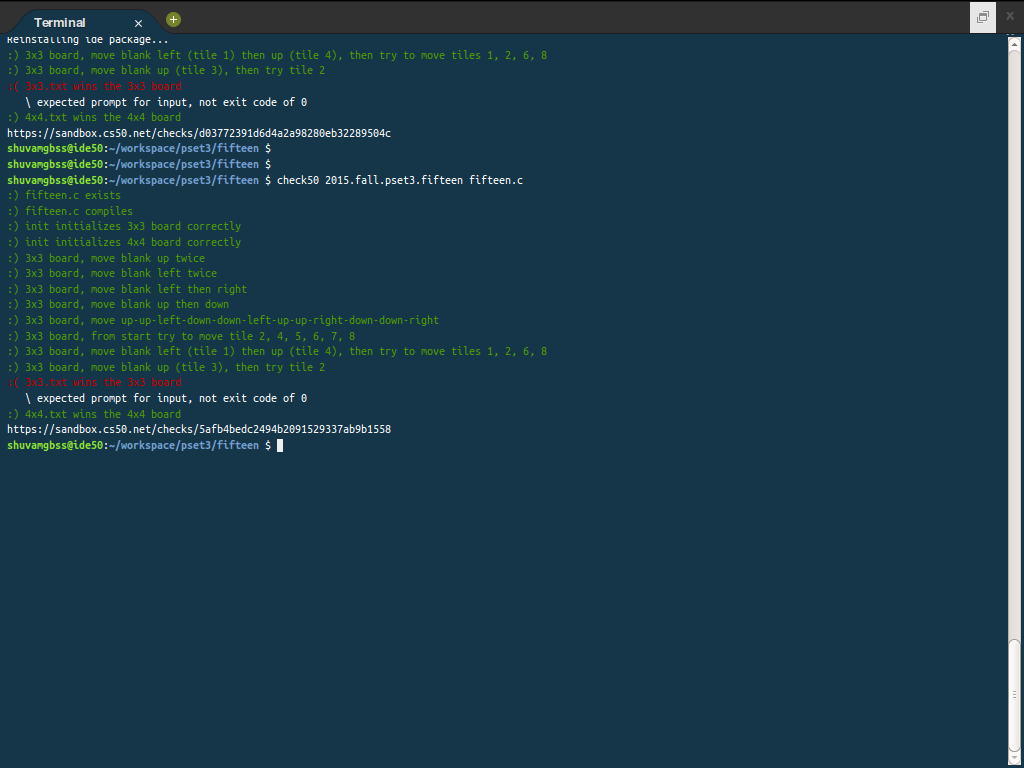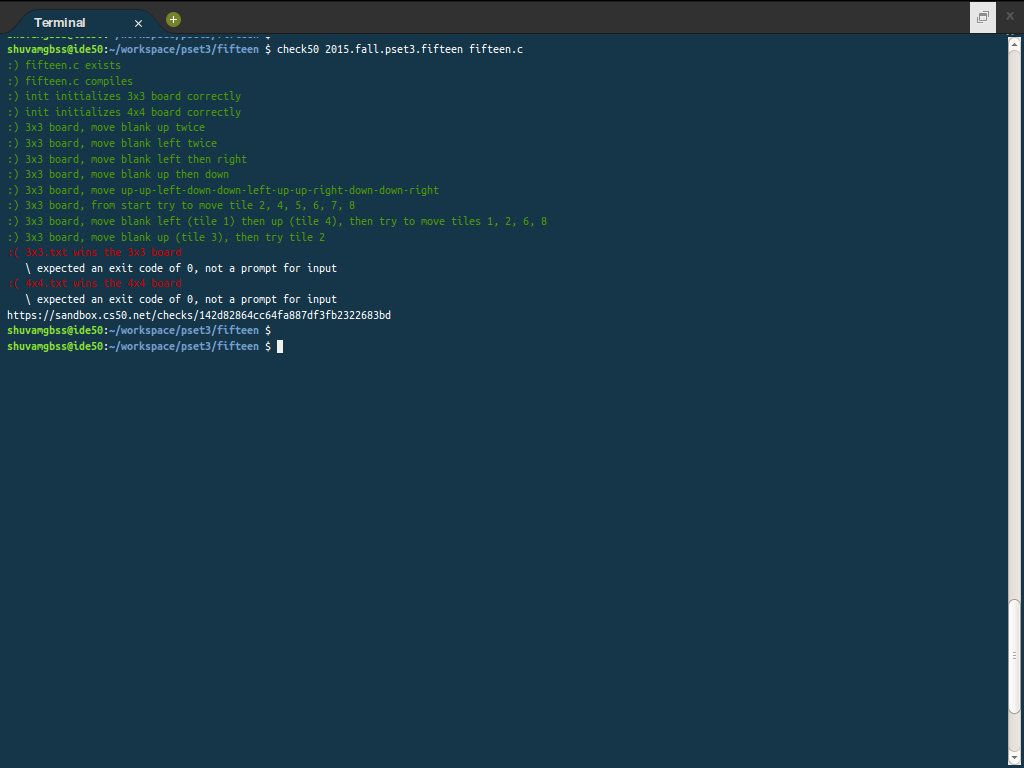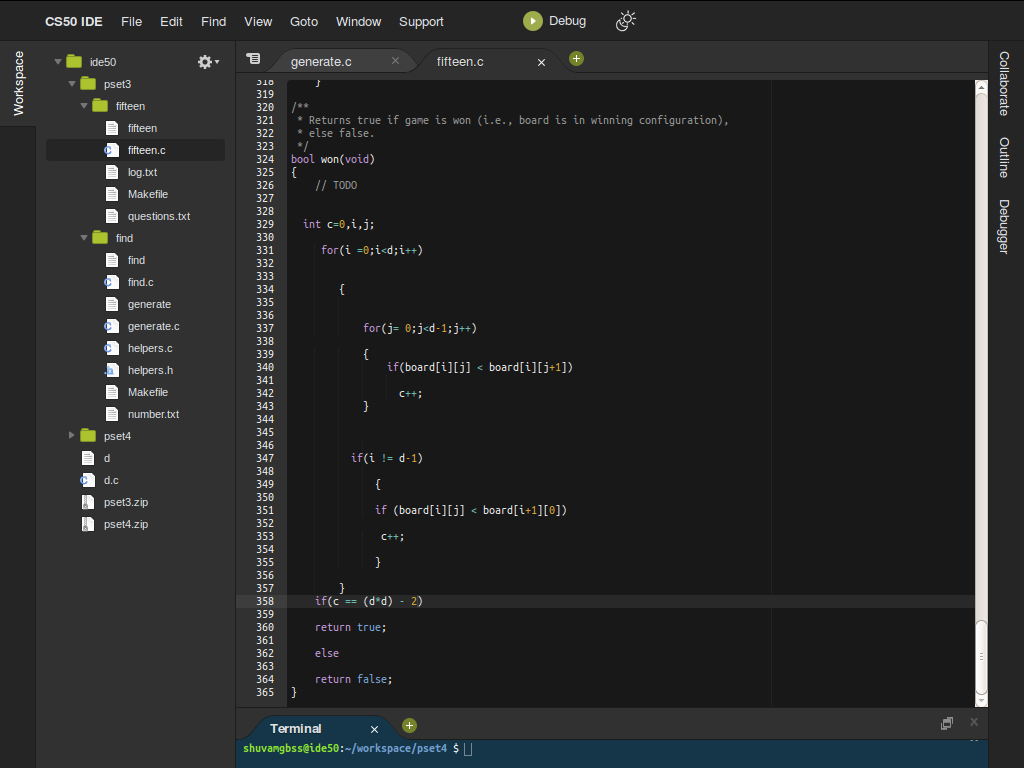When the won function is working.
check50 gives the following result:
And after intentionally making the won function wrong ,the result through check50 is:
Now,it's obvious that to win the game ,won should return true and then the main function should return 0. Then why in the first screenshot(when won function is correct)is it that check50 is expecting prompt for input after attaining winning configuration??? And in the second screenshot(when won is faulty) , why check50 is expecting return code for 0. Both the situations are contradicting..
define _XOPEN_SOURCE 500
include
include
include
include
// constants
define DIM_MIN 3
define DIM_MAX 9
// board int board[DIM_MAX][DIM_MAX];
// dimensions int d;
int g,h;
// prototypes void clear(void); void greet(void); void init(void); void draw(void); bool move(int tile); bool won(void);
int main(int argc, string argv[]) { // ensure proper usage if (argc != 2) { printf("Usage: fifteen d\n"); return 1; }
// ensure valid dimensions
d = atoi(argv[1]);
if (d < DIM_MIN || d > DIM_MAX)
{
printf("Board must be between %i x %i and %i x %i, inclusive.\n",
DIM_MIN, DIM_MIN, DIM_MAX, DIM_MAX);
return 2;
}
// open log
FILE* file = fopen("log.txt", "w");
if (file == NULL)
{
return 3;
}
// greet user with instructions
greet();
// initialize the board
init();
// accept moves until game is won
g = d-1;
h = d-1;
while (true)
{
// clear the screen
clear();
// draw the current state of the board
draw();
// log the current state of the board (for testing)
for (int i = 0; i < d; i++)
{
for (int j = 0; j < d; j++)
{
fprintf(file, "%i", board[i][j]);
if (j < d - 1)
{
fprintf(file, "|");
}
}
fprintf(file, "\n");
}
fflush(file);
// check for win
if (won())
{
printf("ftw!\n");
break;
}
// prompt for move
printf("Tile to move: ");
int tile = GetInt();
// quit if user inputs 0 (for testing)
if (tile == 0)
{
break;
}
// log move (for testing)
fprintf(file, "%i\n", tile);
fflush(file);
// move if possible, else report illegality
if (!move(tile))
{
printf("\nIllegal move.\n");
usleep(500000);
}
// sleep thread for animation's sake
usleep(500000);
}
// close log
fclose(file);
// success
return 0;
}
/** * Clears screen using ANSI escape sequences. */ void clear(void) { printf("\033[2J"); printf("\033[%d;%dH", 0, 0); }
/** * Greets player. */ void greet(void) { clear(); printf("WELCOME TO GAME OF FIFTEEN\n"); usleep(2000000); }
/**
* Initializes the game's board with tiles numbered 1 through d*d - 1
* (i.e., fills 2D array with values but does not actually print them).
*/
void init(void)
{
if(d%2 != 0)
{ int l = (d*d) -1 ;
for(int i =0;i<d;i++)
{
for(int j= 0;j<d;j++)
{
board[i][j] = l;
l--;
}
}
}
else
{
int l = (d*d) -1 ;
for(int i =0;i<d;i++)
{
for(int j= 0;j<d;j++)
{
board[i][j] = l;
l--;
}
}
int temp = board[d-1][d-2];
board[d-1][d-2] = board[d-1][d-3];
board[d-1][d-3] = temp;
}
}
/** * Prints the board in its current state. */ void draw(void) {
for(int i =0;i<d;i++)
{
for(int j= 0;j<d;j++)
{
printf("%2d ",board[i][j]);
}
printf("\n");
}
}
/** * If tile borders empty space, moves tile and returns true, else * returns false. */ bool move(int tile) {
if(tile == board[g][h+1])
{
board[g][h+1] = 0;
board[g][h] = tile;
h = h+1;
return true;
}
else if(tile == board[g+1][h])
{
board[g+1][h] = 0;
board[g][h] = tile;
g = g+1;
return true;
}
else if(tile == board[g-1][h])
{
board[g-1][h] = 0;
board[g][h] = tile;
g=g-1;
return true;
}
else if(tile == board[g][h-1])
{
board[g][h-1] = 0;
board[g][h] = tile;
h=h-1;
return true;
}
else
{
return false;
}
}
/** * Returns true if game is won (i.e., board is in winning configuration), * else false. */ bool won(void) {
int c=0,i,j;
for(i =0;i<d;i++)
{
for(j= 0;j<d-1;j++)
{
if(board[i][j] < board[i][j+1])
c++;
}
if(i != d-1)
{
if (board[i][j] < board[i+1][0])
c++;
}
}
if(c == (d*d) - 2)
return true;
else
return false;
}

wonfunction is printing something, but rather that a win isn't being detected where it should be. This could either be a problem with thewonfunction, or it could be that yourmovefunction isn't putting all the tiles where they're expected to be after running with the test input.